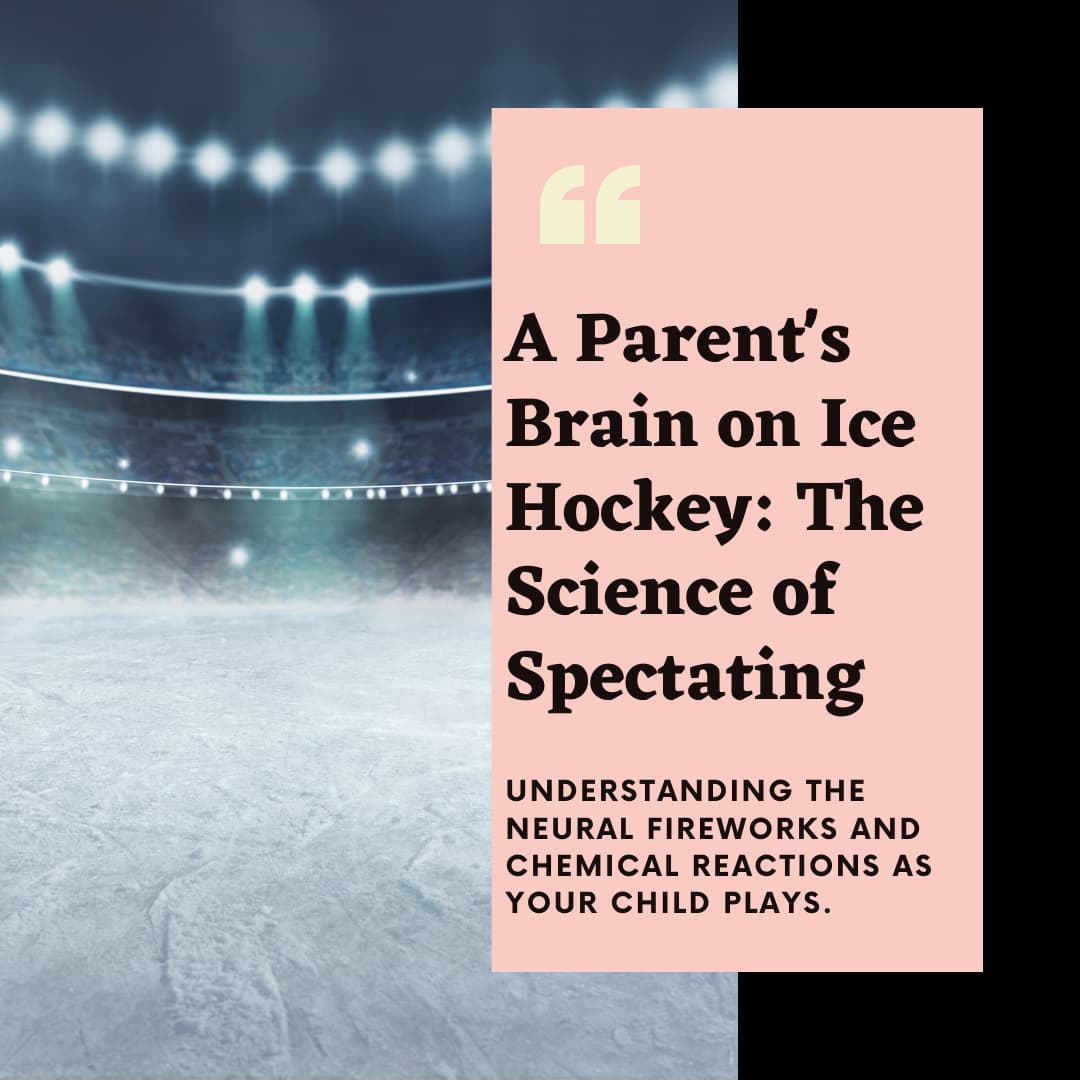The Science Behind Sports Parents’ Behavior in Ice Hockey
This is Your Brain on Ice!
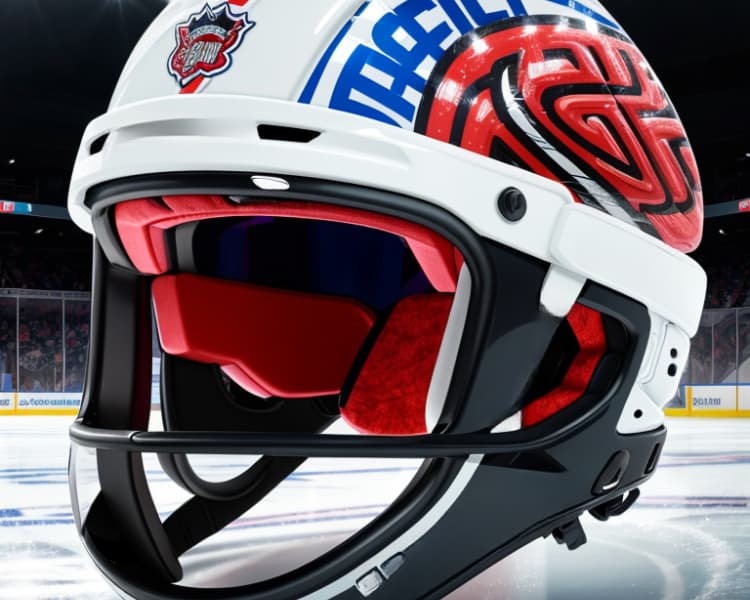
In this article, we’re diving deeper than just surface-level observations of sports parents’ behavior, specifically in the realm of ice hockey and the perception of the parent, and subsequently the following cascade of chemical reactions that cause specific behavior reactions. Ever sat next to a “screamer” who couldn’t help but yell, “Skate, wheels, wheels!” at his kid during a game? Or, how about the parent who interpreted a missed penalty call as such an injustice that he shouted at the glass until he was escorted out of the rink? These actions aren’t just spur-of-the-moment or bad choices; they’re fueled by complex chemical reactions in the brain involving neurotransmitters like dopamine and serotonin, as well as stress hormones like adrenaline, cortisol, and testosterone. As we navigate the high-intensity world of being ice hockey parents, understanding the physiological responses at play can offer invaluable insights for improving both sportsmanship and parenting. So, let’s delve into the fascinating science behind why some parents can get so caught up in the game that they lose sight of good behavior.
Table of Contents
The Biochemical Basis of Ice Hockey Parents’ Behavior
In the realm of ice rinks and hockey games, the complex interplay of neurotransmitters and hormones significantly influences the behavior of sports parents. When a child scores a goal or delivers an impressive play, the brain releases dopamine, a neurotransmitter associated with pleasure and reward. This “dopamine hit” creates a sense of euphoria and accomplishment (by the spectator as well!), which the brain naturally craves again and again, and every “dopamine hit” reinforces the emotional investment in the game.
Meanwhile, serotonin often termed the “mood stabilizer,” helps regulate emotional responses, ensuring parents don’t spiral into extreme emotional states. It complements dopamine by maintaining a balanced mood, contributing to a more focused and calmer demeanor.
On the flip side, stressful situations like a tie-breaking shootout or penalty call trigger the release of adrenaline and cortisol. These stress hormones historically have prepared the body for rapid action, dialing up emotional intensity and physical readiness. Adrenaline sharpens the senses and focuses attention, while cortisol heightens alertness.
Our neurotransmitters and chemical reactions have ancient origins, serving to protect us from threats for billions of years by priming our bodies and minds for fight or flight. Interestingly, these biochemical responses haven’t evolved to distinguish between the perils faced by our ancestors and the stresses of 21st-century life, like watching a heated hockey game.
Together, these neurotransmitters and hormones create the cocktail of emotional and physical responses that we commonly observe in sports parents, from elation and pride to tension and urgency. It’s a forecheck and backcheck of chemical states.
Now, take into account the parent’s perception and lens of the parent either what they interpret as a bad play or a ref’s call…and those chemicals start another cascade of chemical events, and possibly manifest into less desirable behavior by the sports parent.
Understanding the biological underpinnings of our emotions can offer a new layer of insight for parents at the ice rink. So, let’s delve into some key chemicals and hormones—namely dopamine, serotonin, adrenaline, and cortisol—and how they might be playing into your reactions during those nail-biting hockey games and sometimes scary reactions.
Mirror Neurons – Monkey See, Monkey Do
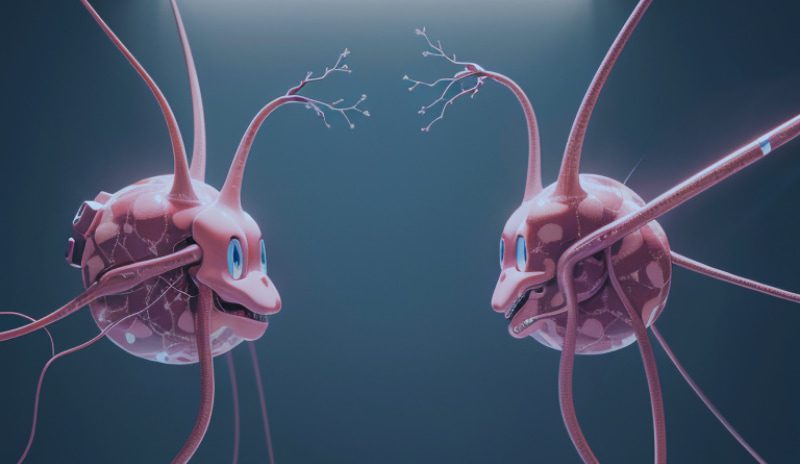
Watching a sports game can evoke intense emotions, often making spectators feel as if they’re part of the action.
Mirror neurons are specialized cells in the brain that fire both when an individual performs an action and when they observe someone else performing the same action. Discovered in the early 1990s, these mirror neurons are thought to play a significant role in understanding others’ actions, learning through imitation, and even empathizing with others’ feelings or sensations. (6)
For example, if you watch someone take a slapshot in a hockey game, the mirror neurons associated with that action would be activated in your brain, almost as if you were taking the slapshot yourself. This neural activity is believed to help you understand the action and its intent, and may also contribute to your emotional experience as a viewer. (5)
Mirror neurons are considered crucial in various cognitive functions, including language comprehension, social interaction, and emotional understanding. They enable us to put ourselves in another person’s “shoes,” allowing for a deeper emotional connection and better understanding of their experiences. (5)
While mirror neurons don’t allow us to feel the exact physical sensations the athletes are experiencing, they do enable us to emotionally engage in the game as if we were part of it. This explains why fans and parents can feel so invested in a game’s outcome and why they might refer to the team’s performance using inclusive terms like “we.” Mirror neurons can contribute to making the spectator experience almost as emotionally charged as being on the ice. (6)
When parents or fans are watching a hockey game, these mirror neurons are also activated, particularly when watching a team or player they strongly identify with. For example, when parents or fans feel they “know” the team or players well, they are more likely to vicariously experience some of the emotions the athletes are feeling. This neurological process intensifies the emotional investment in the game. (3)
The Role of Dopamine, Serotonin, Adrenaline, and Cortisol in Sports Parent Behavior
Dopamine and serotonin are neurotransmitters that serve as chemical communicators in the body, playing a key role in regulating various physiological functions. These neuro-transmitting chemicals, along with the hormones adrenaline, testosterone, and cortisol can together cause the various behavioral reactions we see at our youth sports games. The brain and body work as a system, never solo. But, rather, these chemicals are signals, triggers, and little communicators tipping off the NEXT chemical reaction that we see displayed in both good and bad parent behavior. (4)
Dopamine: The “Reward” Neurotransmitter
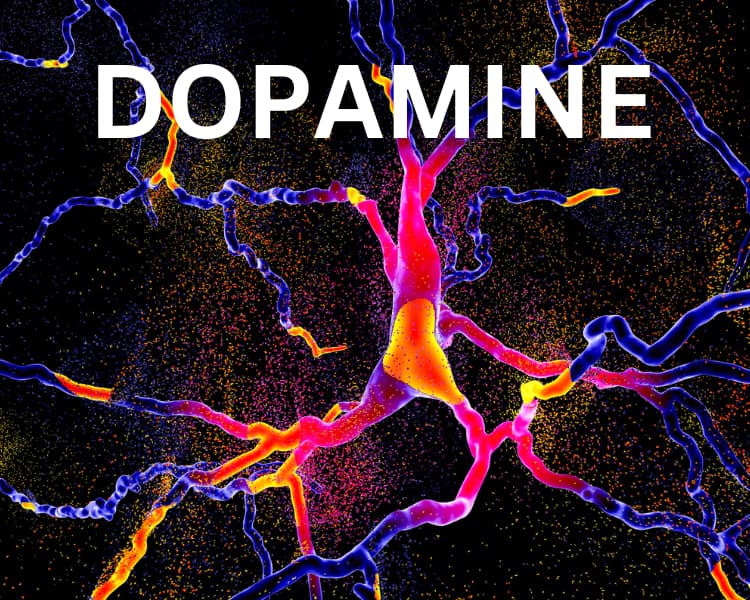
Often called the “feel-good” neurotransmitter, dopamine is associated with feelings of pleasure and satisfaction. It’s released during pleasurable situations, encouraging you to seek out the behavior again. (1)
When your child scores a goal or makes a fantastic play, dopamine is released, reinforcing the positive experience and making you crave more of these moments. The surge of dopamine can make you the “cheerleader” parent, always looking for the next highlight-reel moment. (1)
Serotonin: The “Mood Regulator” Neurotransmitter
Serotonin helps regulate mood, emotion, and sleep. It contributes to well-being and happiness and is often targeted by antidepressant medications.

A balanced level of serotonin can contribute to calm, focused attention during the game. Low levels may result in increased anxiety or mood swings. During a loss, there might be a reduction in the production of serotonin during these low moments. This could lead to heightened feelings of anger and even symptoms of depression.
Ever feel unusually calm when your child’s team is losing but you’re hopeful for a comeback? That might be your serotonin levels helping you stay balanced.
The brain’s production of neurotransmitters and hormones significantly affects how we react to our favorite sports teams’ performance. Chemicals like dopamine and serotonin, generated by the brain, play a crucial role in regulating our emotions and mood.
Adrenaline: The “Fight or Flight” Hormone
The Adrenal Society; 2022, (1) summarizes Adrenal hormones as follows:
Adrenaline is a hormone synthesized in the adrenal glands’ medulla and also in certain neurons within the central nervous system. During stressful situations, this hormone is rapidly released into the bloodstream, sending signals to various organs to prepare the body for quick action. This quick surge in adrenaline levels typically occurs within a matter of minutes, facilitating immediate physiological responses. (1)
The primary function of adrenaline is to activate the body’s fight-or-flight response. Upon its release, adrenaline prompts the dilation of air passages, enabling muscles to receive the oxygen they need to either combat a threat or make a quick getaway.
Additionally, the hormone causes blood vessels to constrict, channeling blood flow to major muscle groups like the heart and lungs.
The impact of adrenaline goes beyond just immediate physical responses; it also influences perception and performance. For instance, the hormone reduces the body’s sensitivity to pain, allowing individuals to continue running or fighting even if they are injured.
Adrenaline can heighten strength and awareness, enhancing overall performance during stressful events. Once the stressor is no longer present, the effects of adrenaline can linger for up to an hour, gradually wearing off as the body returns to its normal state.

How it Affects Sports Parents: Adrenaline spikes can make you overly reactive—perhaps leading to the “screamer” or “angry” parent categories. It’s your body’s natural way to prepare for what it perceives as a critical situation during a real crisis, not a call perceived by a parent as an unfair call.
In Context: A close game during the final period might cause an adrenaline surge, leading you to become vocally or emotionally intense.
Cortisol: The “Stress” Hormone
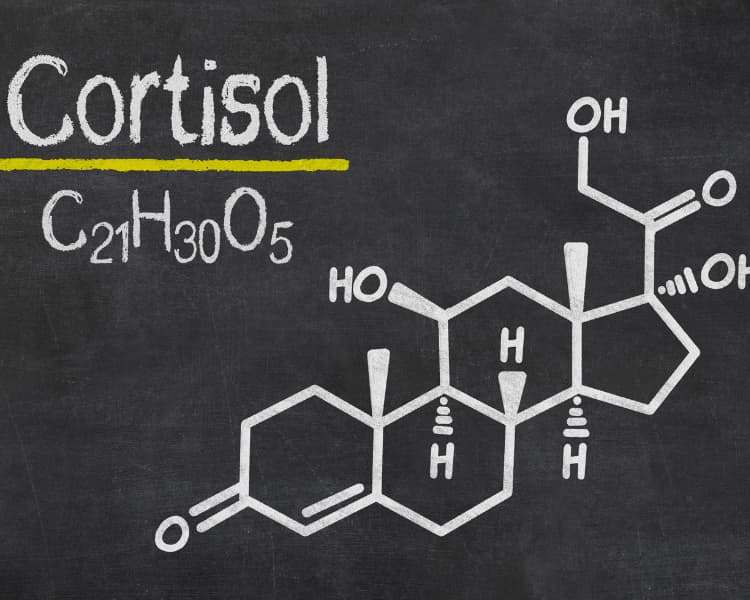
Cortisol is commonly known as the “stress hormone” due to its role in the body’s stress response. However, its functions extend beyond just managing stress, and a better understanding of cortisol can contribute to achieving hormonal balance and overall good health. (1)
Produced in the adrenal glands that sit on top of the kidneys, cortisol is a type of steroid hormone that interacts with most cells in the body, as these cells possess cortisol receptors.
Cortisol performs a multitude of roles that impact various bodily functions. It plays a part in controlling blood sugar levels and metabolism, as well as aiding in reducing inflammation. Additionally, cortisol is involved in memory formation and helps regulate blood pressure by affecting salt and water balance in the body. (1)
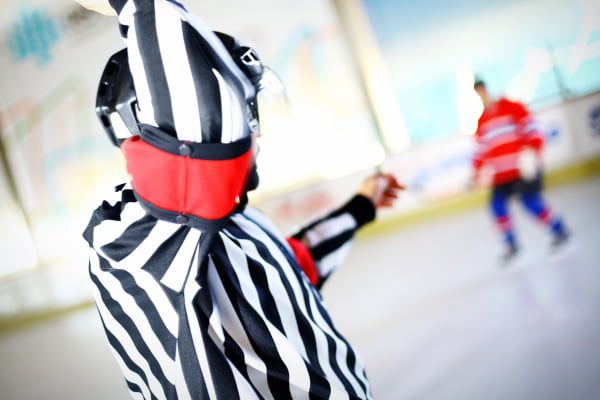
Under stress back in prehistoric times, cortisol was released when a Tyrannosaurus rex would appear. It enables the human being to increase sugars in the bloodstream (for energy to fight the dino), enhances brain function (to be optimally focused and make the best getaway), and suppresses non-essential functions like digestion (to allow for more important functions in the body and less distraction).
Yet, when we do not use up the cortisol just sitting and watching a game, it can cause the parent or fan to feel increasingly nervous or jittery.
Elevated cortisol levels can make you edgy, anxious, and overly critical—perhaps manifesting as the “Pacer” or even the “Angry” parents. Some parents exhibit aggressive behaviors or become confrontational under stress, mix this with adrenaline and the testosterone below…it’s a recipe for the raging parent, who may make poor decisions and even act out physically. (4)
Testosterone: The Status Hormone
The role of testosterone in athletes experiencing a surge of self-esteem after winning a game is well-documented. However, there’s an emerging understanding that spectators, including parents watching youth sports games, might experience similar hormonal changes. Researchers like Bernhardt have used saliva samples to gauge biochemical changes in the body and found compelling data. (2)

Normally, testosterone levels reach their peak shortly after you wake up and decline by approximately 35% by the time you go to bed. Bernhardt’s study revealed that spectators who witnessed a win showed a 20% increase in their testosterone levels, closely mirroring what players experience. Interestingly, the levels for fans of the losing team dropped by the same percentage, though this was less emphasized due to the natural decline in testosterone levels around that time of day. (2)
The significance of this research extends beyond merely associating testosterone with physical or aggressive behavior. It illustrates that testosterone plays a role in the psychological dimensions of experience, like the feeling of increased status during moments of intense competition. Bernhardt argues that spectators, or in this context, parents, undergo a vicarious experience of both the competition and the accompanying status gains. Subsequent research has reinforced these findings, indicating that other neurochemicals linked with athletic performance, including dopamine and adrenaline, behave similarly in both athletes and their supporters during a game. (2)
The Influence of Testosterone on Sports Parents’ Reactions and Behavior
If a hockey parent has elevated levels of testosterone during a game where they’re unhappy with the outcome or proceedings, their actions may become more intense and competitive. This could include vocally expressing their displeasure toward referees, coaches, or even their own child, aiming to sway the course of the match. (2)
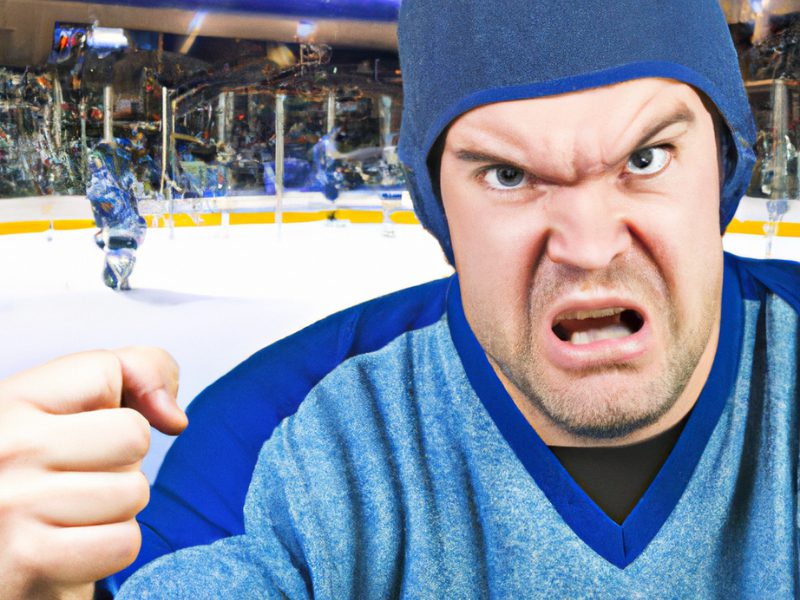
Physical signs, such as tightened fists, a stiff stance, or walking nervously back and forth, might also be noticeable. Additionally, the parent may enter into heated conversations or disputes with other spectators or authority figures at the event. In extreme scenarios, this heightened emotional condition could lead to confrontations with coaching staff or officials after the game
.
While hormones like testosterone can impact our behavior, it’s important to note that they don’t justify poor sportsmanship or disruptive actions. Being emotionally charged due to hormonal changes doesn’t excuse negatively affecting the game’s atmosphere or sportsmanship for others involved.
Self-Regulation: A Call to Action for Sports Parents

The neurotransmitters and chemical reactions that have evolved over billions of years to help us confront or flee from danger are still at work today, even though our brains may not differentiate between ancestral threats and modern-day stressors like tense hockey.
Knowing the chemistry behind your emotions can help you become more aware of your reactions and maybe even lead you to manage them more effectively. Next time you find yourself pacing, screaming, or simply feeling a rush of joy at the rink, remember: it’s not just the game at play—it’s also your biochemistry.
At this juncture, it’s crucial for us to consciously advance both emotionally and psychologically. By recognizing these primal reactions as they happen, preparing for their onset, and having a strategy to self-soothe, we can prevent ourselves from reacting impulsively.
Tips for parents on how to manage these physiological responses:
Managing intense physiological responses during your child’s hockey game isn’t just about keeping your cool; it’s about understanding the biochemistry that fuels your emotions and reactions. Here are some strategies for ensuring a more positive experience for everyone involved:
- Pre-Game Relaxation: Consider engaging in some relaxation techniques before the game starts. Deep breathing or a quick meditation can help balance neurotransmitter levels.
- Recognize the Signs: Learn to identify the physical and emotional signs of stress hormones like adrenaline and cortisol kicking in. Increased heart rate, tense muscles, and heightened awareness could be indicators.
- Use Positive Reinforcement: When you feel the surge of dopamine as your child’s team scores, leverage that for positive reinforcement. Cheering in an encouraging manner can help balance out the neurotransmitters affecting mood.
- Reality Check: Remind yourself that the stress hormones coursing through your veins are the same ones our ancestors used to survive life-threatening situations—this perspective can sometimes minimize your emotional response.
- Have a Go-To Distraction: Sometimes, the best way to deal with rising tension is to momentarily focus on something else. Keep a stress ball handy or doodle on a notepad to keep your hands busy and mind focused.
- Talk It Out: Discussing your sensations and feelings with another parent or friend can sometimes help regulate serotonin levels, reducing feelings of anger or depression.
- Physical Movement: If you feel the agitation growing, don’t underestimate the power of taking a quick walk around the rink. Physical activity can help dissipate excess adrenaline and cortisol.
- Post-Game Cool Down: Just like athletes, parents also need to cool down after a high-stress game. A quick post-game walk or a few minutes of quiet reflection can go a long way in bringing your physiological responses back to baseline.
- Seek Professional Guidance: If you find it difficult to control your emotional and physiological responses, you might benefit from professional advice. Therapists can offer coping strategies tailored to your needs.
By actively recognizing and managing these inherent physiological responses, parents can contribute to a more enjoyable and less stressful sports experience for everyone involved, most importantly the kids.
References:
1. Bancos, M.D., Irina; Endocrine Society; Adrenal Hormones., s://www.endocrine.org/patient-engagement/endocrine-library/hormones-and-endocrine-function/adrenal-hormones; Last updated: January 24, 2022
2. Bernhardt PC, Dabbs JM Jr, Fielden JA, Lutter CD. Testosterone changes during vicarious experiences of winning and losing among fans at sporting events. Physiol Behav. 1998 Aug;65(1):59-62. doi: 10.1016/s0031-9384(98)00147-4. PMID: 9811365.
3. Barth, Brian; The Unique Neurology of the Sports Fan’s Brain; Psychology; https://nautil.us/the-unique-neurology-of-the-sports-fans-brain-236053/; August 3, 2016.
4. Jones, J.M. As Industry Grows, Percentage of U.S. Sports Fans Steady. Gallup.com (2015)
5. Muska, Scott; NBC News; Mirror Neurons Make You Feel Like Part of the Team. https://www.nbcnews.com/better/health/what-happens-your-body-brain-when-you-watch-football-ncna814401l; Oct. 26, 2017; Updated Feb. 4, 2018.
6. Schieber, Marc H.; Cell: Current Biology; Mirror Neurons:Reflecting on the Motor Cortex and SpinalCord; http://dx.doi.org/10.1016/j.cub.2013.01.004; 2013

